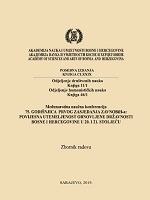UTJECAJ ZAVNOBIH-A NA KULTURU I OBRAZOVANJE U BOSNI I HERCEGOVINI NAKON DRUGOG SVJETSKOG RATA
THE INFLUENCE OF ZAVNOBIH IN CULTURE AND EDUCATION IN BOSNIA AND HERZEGOVINA AFTER THE SECOND WORLD WAR
Author(s): Muhamed Nametak
Subject(s): Cultural history, Political history, Social history, History of Education, State/Government and Education, WW II and following years (1940 - 1949), Post-War period (1950 - 1989)
Published by: Akademija Nauka i Umjetnosti Bosne i Hercegovine
Keywords: Culture; Education; Propaganda; Ideology; Literature;
Summary/Abstract: The creation of a socialist society as a strategic and long-term objective, which, admittedly, was not only brought before the culture, remained unfulfilled throughout the entire socialist period, although certain socialist values eventually had become a part of everyday culture. These values included secularization, the cult of industrial work, the installation of the Party as the supreme authority in all fields of human activity and the like. The greatest achievements should definitely include significant reduction of illiteracy rate, construction of numerous schools, cultural centers, libraries and other cultural institutions. Also, this period saw the emergence of a number of periodicals covering cultural life, the opening of publishing companies, cinemas, cultural centers, which are all prerequisites for a successful cultural development of a modern society. The opening of the University of Sarajevo in 1949, as the most important educational institution in Bosnia and Herzegovina to this day, is highlighted as the culmination of institutional building. The foundations of contemporary cultural life in Bosnia and Herzegovina were precisely laid through cultural policy in the after the Second world War. The base that was created at that point was enriched over time in accordance with the possibilities and needs, to eventually become that what is available to the people at present day. On the other hand, adverse elements that cultural policy of socialist authorites had brought to the people in Bosnia and Herzegovina can not be ignored. First of all, the nationalization of the material base of cultural policy, which used to be private property, followed by the repressive policy over a part of cultural and intellectual elite that held the opposite ideological standpoints delivered a severe blow to independent cultural work and destroyed a part of the cultural and intellectual elite in this region. In addition, the direct control of the operation of cultural institutions and indirect control of the individual cultural work through decisions on funding, censorship and the like, provided for an ideological background for the entire cultural life of that period, and at the same time hampered independent initiative and independent work of cultural workers.
- Page Range: 181-196
- Page Count: 16
- Publication Year: 2019
- Language: Bosnian
- Content File-PDF

